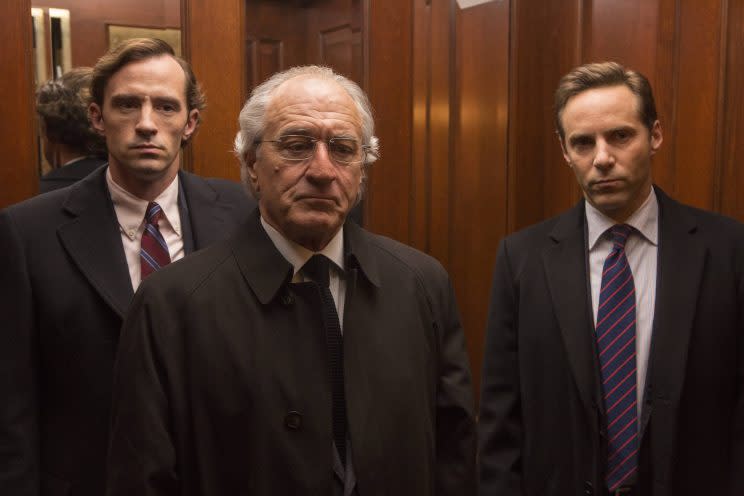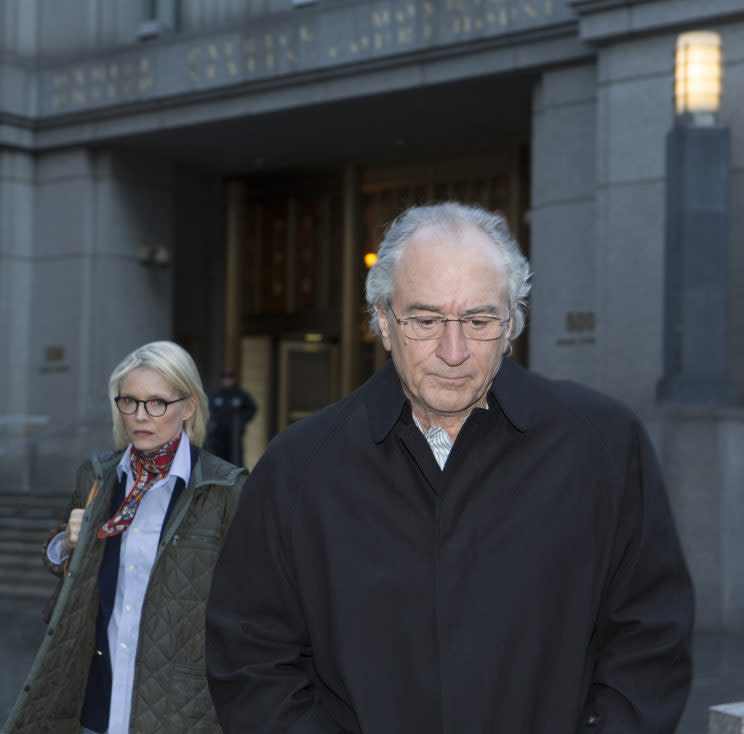HBO's Bernie Madoff movie is more 'wizard' than 'lies'
“The Wizard of Lies,” HBO’s telling of the fallout of Bernie Madoff’s 20-year-long Ponzi scheme, has a lot of ground to cover.
How much do you bite off without turning the movie, which airs May 20, into a “survey”? Director Barry Levinson made a choice to keep the focus more on Madoff (the “Wizard”), played by Robert De Niro, and less on his scheme (the “lies”), a move that may be seen by some as polarizing.
It’s understandable—you don’t have Robert De Niro at the top of the marquee and make a movie about the victims or the ins and outs of how it happened. Instead, you make a tight character study of a man pulled in different ways by a thousand strings. And you definitely don’t do that when your source material is from a book by Diana B. Henriques, the first journalist to interview Madoff in prison. (Yahoo Finance interviews Henriques in the video above.)

Still, Levinson takes a gamble by keeping it so tightly focused. Unlike the much acclaimed “The Big Short,” even financial details regarding Madoff’s malfeasance are hardly explained beyond a simplistic rob-Peter-to-pay-Paul scheme, even in a subtle way tucked into dialogue. (“The Big Short” broke the fourth wall to keep audiences in the loop.)
Instead, you’re meant to draw on what you already know from the glut of media the scandal produced back in 2008. You may know that Madoff took money from new investors – conning them out of $65 billion in total – and paid the older ones, telling them it was profit. You may also know that Kevin Bacon and John Malkovich were among his many victims. (Madoff is serving a 150-year sentence in federal prison.)
What this leaves us with is the story of a family torn apart, something that may or may not make the film satisfying to you given everything else outside the tunnel vision on Madoff. And with a focus like that, the question of authenticity immediately comes up for the viewer. Are we seeing Hollywood dramatize asset management gone wrong, a “how something like this might happen” kind of thing, or is this what it was really like?
With De Niro being such an icon, you have to wonder if this is anything like Bernie Madoff. Are we getting De Niro playing a De Niro character—compelling and authentic as someone in this situation, but not really Bernie?
It’s hard to say. Madoff’s voice sounds nothing like De Niro’s, save for the New York, and he’s not as handsome. But Henriques, a former New York Times reporter, who plays herself in the movie, has said De Niro really did become Madoff, something that does gives the film credibility.

Given that the film is a look at the fallout from the family patriarch defrauding his innocent investors out of billions, Michelle Pfeiffer provides a needed contrast for De Niro’s Madoff to work. Dressed in Ruth Madoff’s cropped blond hair, dark frames, and Queens accent, Pfeiffer steals every scene she’s in, adding another big and compelling personality to a story. While her fall from New York finance aristocracy to a middle-class life in Florida isn’t at all sympathetic, Pfeiffer plays her in a complex way that makes her fluctuations from attempting suicide to appearing to adjust to everything to despair believable and, therefore, fascinating to watch.
Though it’s clear where the focus of the film is, it does feel as if Levinson literally does to the audience what Madoff did with his kids: shutting them out completely from the scheme. (However, the sons’ lack of involvement has been disputed.) Further detail about how the fraud was perpetrated is hardly presented in “Lies.” We’re just to know that Madoff and his colorful right-hand man, Frank DiPascali (Hank Azaria), are smooth operators. A Ponzi scheme may be easy to explain, but Madoff and DiPascali’s con, the biggest of all time, seems like a whole lot of gold left in the dirt.
A big thing absent in “Lies” is much at all about the victims, or the famous whistleblower Harry Markopolos, who only gets a line about his name. A series of one-sentence vignettes detail some of the consequences for investors, before moving on. Angry voicemails and confrontations on the street with clients serve merely as minor points for De Niro and the Madoff family to play against. Perhaps this is by design. It’s not hard to see how the scale tips when you weigh doing a portrait of the man who perpetrated the world’s biggest con opposite a sob story in which the institutional investors and the investment class in general lose their cash—all of it in some cases. Since they just don’t make violins small enough, this is what we get.
Ethan Wolff-Mann is a writer at Yahoo Finance focusing on consumer issues, tech, and personal finance. Follow him on Twitter @ewolffmann. Got a tip? Send it to tips@yahoo-inc.com.
Read more:
Airlines are giving crews leeway to hand out money when necessary
Banks take just 90 seconds to approve a credit card. Here’s what they look for.
Uber’s new tipping dilemma: low prices or smooth experience
Zuckerberg at Facebook conference: if you take one thing away—this is it
The cost of unifying North and South Korea
The trick to getting credit card fees waived? Just ask
Chase’s Sapphire Reserve is very worth it, even with its slashed bonus
